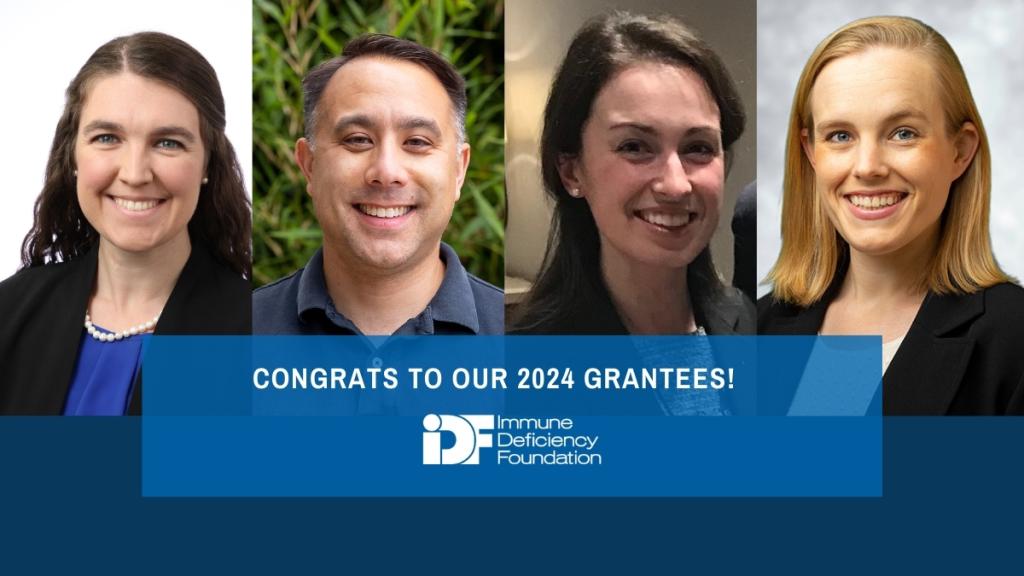
-
Understanding primary immunodeficiency (PI)

Understanding PI
The more you understand about primary immunodeficiency (PI), the better you can live with the disease or support others in your life with PI. Learn more about PI, including the various diagnoses and treatment options.
-
Living with PI
-
Addressing mental health
-
Explaining your diagnosis
- General care
- Get support
- For parents and guardians
-
Managing workplace issues
- Navigating insurance
-
Traveling safely

Living with PI
Living with primary immunodeficiency (PI) can be challenging, but you’re not alone—many people with PI lead full and active lives. With the right support and resources, you can, too.
-
Addressing mental health
-
Get involved

Get involved
Be a hero for those with PI. Change lives by promoting primary immunodeficiency (PI) awareness and taking action in your community through advocacy, donating, volunteering, or fundraising.
-
Advancing research and clinical care
-
Grants
-
IDF surveys
-
Participating in clinical trials
-
Diagnosing PI
-
Consulting immunologist
-
Clinician education

Advancing research and clinical care
Whether you’re a clinician, researcher, or an individual with primary immunodeficiency (PI), IDF has resources to help you advance the field. Get details on surveys, grants, and clinical trials.
-
Grants

Research grant program announces supported projects for 2024
Grantees focused on reducing time to diagnosis for primary immunodeficiency
Baltimore, MD
The Immune Deficiency Foundation (IDF) recently announced the 2024 Research Grant projects that will be supported with a total of $150,000 in funding.
Launched in 2016, IDF’s Research Grant Program supports patient-centered research focused on improving the treatment, health, disease management, or diagnosis of people with primary immunodeficiencies (PIs), also known as inborn errors of immunity (IEI), as well as research that contributes to the general body of PI knowledge.
The four projects selected for 2024 are aimed at reducing the time to diagnosis for those with PIs, a core goal of the foundation:
- Dr. Emily Harris, a clinical fellow in pediatric hematology/oncology at Dana-Farber/Boston Children’s Cancer and Blood Disorders Center - Improving Evans syndrome diagnosis and treatment.
- Dr. David Nguyen, assistant professor at the University of California, San Francisco - Probing genetic variants in JAK3.
- Dr. Alexandra Martinson, pediatrics research track resident at Children's National Hospital in Washington, D.C. - Improving machine learning for PI diagnosis.
- Dr. Lauren Meyer, pediatric hematology/oncology fellow at Seattle Children’s Hospital - Screening for hemophagocytic lymphohistiocytosis (HLH) with common lab tests.
Learn more about each research project funded for 2024.
Awardees are selected by the IDF’s Research Committee, made up of recognized immunologists and past grant awardees. They review and score research proposals through a peer review process based on the system used by the National Institutes of Health (NIH).
The committee recommends funding proposals with the highest scores, ensuring an unbiased and independent selection process based solely on scientific merit. The Michael Blaese Research Grant Award is given to the highest-scored application each cycle, which for 2024 was submitted by Dr. Emily Harris for Improving Evans syndrome diagnosis and treatment.
“The inspiring and groundbreaking work of researchers drives important advancements that improve testing and treatment options for the PI community,” said Jorey Berry, President & CEO of the Immune Deficiency Foundation. “While we have a diverse cross-section of grantees for this year, all of the projects are focused on reducing the time to diagnosis. We are grateful for the work of these researchers and their teams in finding new solutions to this important challenge.”
About primary immunodeficiency
Primary immunodeficiencies (PIs), also known as inborn errors of immunity (IEI), are a group of more than 450 rare, chronic conditions in which part of the body's immune system is missing or does not function correctly. According to the National Institutes of Health, there are approximately 500,000 individuals in the U.S. with a PI. These conditions are caused by hereditary genetic defects and can affect anyone, regardless of age, gender, or ethnicity. PI can cause infection, malignancy (cancer), allergy, autoimmunity, autoinflammation, or any simultaneous combination of these issues.
About the Immune Deficiency Foundation
The Immune Deficiency Foundation (IDF) is the largest primary immunodeficiency (PI) patient advocacy group in the United States, with 44 years of expertise in primary immunodeficiency. As such, we take pride in helping to connect, engage, and empower families to live longer, stronger, healthier lives. Whether you are looking for subject matter experts on PI (clinicians or patients), information about an upcoming event, or a statement from the organization on a particular topic, we can offer guidance and resources in a variety of areas, including:
- Stories of rare, chronic, or invisible illness.
- Insurance access challenges.
- Plasma supply (and plasma-derived therapies).
- Issues related to the immunocompromised.
- The importance of newborn screening (particularly related to SCID).
- Genetic and inherited conditions.
- General healthcare or nonprofit topics.
- Difficult/long journeys to diagnosis.
Press room
A hub of information for journalists interested in writing about the Immune Deficiency Foundation (IDF) with direct links to learn more about IDF, primary immunodeficiency, and those affected.
Learn more about Immune Deficiency FoundationRelated resources
Sign up for updates from IDF
Receive news and helpful resources to your cell phone or inbox. You can change or cancel your subscription at any time.





The Immune Deficiency Foundation improves the diagnosis, treatment, and quality of life for every person affected by primary immunodeficiency.
We foster a community that is connected, engaged, and empowered through advocacy, education, and research.
Combined Charity Campaign | CFC# 66309




